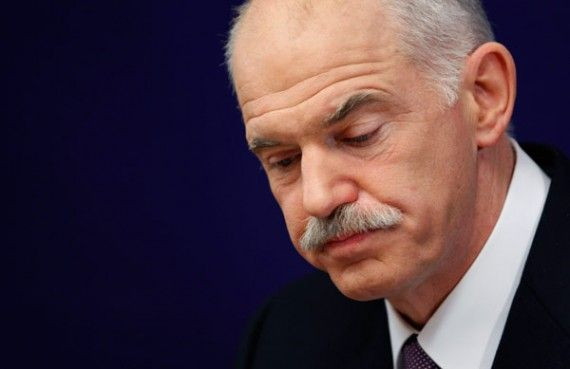Papandreou Faces Defections from Ruling Party; Opposition Calls for Early Elections

Greek Prime Minister George Papandreou, who has called for a referendum on the latest rescue package from Eurozone leaders, is facing a wave of defections from his own ruling Pasok party, ahead of a confidence vote due on Friday. Six prominent members of Pasok have called on Papandreou to resign. Another MP has quit Pasok, thereby reducing the party’s parliamentary majority – the party now holds 152 out of 300 seats.
Meanwhile, the principal opposition party New Democrats, have called for early elections, warning that the referendum that Papandreou has proposed could endanger Greece’s membership in the European Union (EU).
Antonis Samaras, leader of New Democrats, told the press: In order to save himself, Mr. Papandreou has posed a dilemma of blackmail that puts our future and our position in Europe in danger.”
However, the next elections are not due for two years – and Papandreou has ruled out calling an early poll saying it would be bad for the country.
A summit of Eurozone leaders in Brussels last week led to an agreement under which private holders of Greek debt would have to accept a 50 percent loss; the Euro nations also agreed to provide Athens with another 100 billion euro ($140 billion) loan.
In exchange, Greece is being pressures to make even deeper cuts in public spending, fire more public sector workers and slash more wages and pensions.
However, Reuters reports that almost 60 percent of Greeks view the new EU agreement providing for a new bailout package as “negative” or “probably negative”, according to a survey taken Saturday by a Greek newspaper.
Vasso Papandreou, a Pasok member and no relation to the Prime Minister, stated: I call on the president to convene the council of political leaders with the goal of forming a government of national salvation in view of safeguarding the EU package agreed on 27 October, and then to immediately hold elections.”
Paul Mason, the economics editor for BBC-Newsnight, wrote of the referendum: “[It] is while it lasts… effectively a plebiscite on euro membership. I say while it lasts because the opposition is mobilizing a parliamentary maneuver to bring down the government, which may succeed - returning Europe to its status quo of containable trauma.”
Mason added: “If Greeks reject the 50 percent controlled default on debts they owe to the banking sector, then… Greek debt spirals out of control and the country goes bust.”
Greece’s health minister Andreas Loverdos plans to tell Papandreou that his call for a referendum is wrong and should be cancelled, according to Bloomberg, citing a report in the Proto Thema newspaper in Athens reported.
Separately, Greece’s finance minister Evangelos Venizelos was rushed to the hospital on Tuesday morning complaining of stomach pains. According to reports, Venizelos was given no early notice that Papandreou planned a referendum,
It is not known if the two events are related.
Venizelos had no idea about the referendum. All he knew about was the vote of confidence, an unnamed government official told Reuters.
He told Papandreou he should inform foreign partners and a letter was drafted in the early hours.
© Copyright IBTimes 2025. All rights reserved.





















